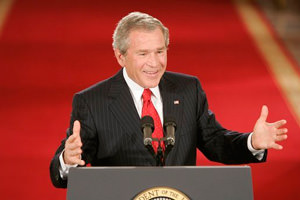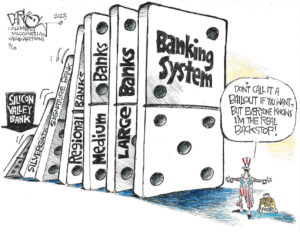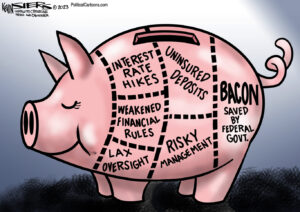La Vie en Denial
I read "Decision Points" and it turns out that George W. Bush is the Edith Piaf of fiscal policy: He regrets nothing.
It was, or so I thought, a dandy column idea: an imaginary, missing chapter of George W. Bush’s “Decision Points,” in which the former president would admit to having made the wrong call on taxes.
The imaginary but completely delusional: My inner Bush would not regret pushing for the tax cuts. But he would acknowledge — how hard could this be? — that Alan Greenspan was right when he suggested a trigger mechanism to cancel the cuts if the promised surplus failed to materialize.
If only …
Of course, that surplus was a mirage. Rather than presiding over erasure of the publicly held national debt, Bush watched it grow from $5.6 trillion to nearly $10 trillion.
Like the surplus, my quasi-apologetic chapter evaporated in the face of reality. I read “Decision Points” and it turns out that Bush is the Edith Piaf of fiscal policy: He regrets nothing.
“For years, I listened to politicians from both sides of the aisle allege that I had squandered the massive surplus I inherited. That never made sense,” Bush writes. “Much of the surplus was an illusion, based on the mistaken assumption that the 1990s boom would continue. Once the recession and 9/11 hit, there was little surplus left.”
Now he tells us? This illusory surplus was the cornerstone on which Bush built his economic policy. “You see, the growing surplus exists because taxes are too high and government is charging more than it needs,” Bush said in February 2001.
Far from sounding cautionary notes, the administration asserted its surplus estimates were, if anything, conservative. “If there’s going to be a mistake, the likelihood is a mistake will be made on the other side of the scale, that more revenue will come in,” press secretary Ari Fleischer said in March 2001. You know how that worked out.
“I took my responsibility to be a good fiscal steward seriously,” Bush writes.
How’s that? Bush chose to go to war, but, unlike any other wartime president, opted to pay the cost entirely with borrowed funds while pressing for additional tax cuts. He laments that he left behind “a serious long-term fiscal problem” of runaway entitlement spending but blames resistance from both parties in Congress — without acknowledging that he added an expensive and unpaid-for new entitlement, the Medicare prescription drug plan.
And those tax cuts. “It was true that tax cuts increase the deficit in the short term,” Bush acknowledges. “But I believed the tax cuts, especially those on capital gains and dividends, would stimulate economic growth. The tax revenues from that growth, combined with spending restraint, would help lower the deficit.”
This is cleverer than the usual supply-side formulation but still suffers from the tax-cuts-pay-for-themselves fallacy. Bush’s own chief economic adviser, Gregory Mankiw, has estimated that over the long run, cuts on investment taxes generate enough economic growth to make up only half of lost revenue.
Bush offers up a handy chart showing that he spent less (as a percentage of the economy) and ran lower deficits than his two Republican predecessors, and compared reasonably well to Bill Clinton.
Except Bush’s averages are misleading. For one thing, he cherry-picks his fiscal years. He gives himself credit for the 2001 surplus, 1.3 percent of GDP, even though that course was largely set when he took office. At the other end, Bush takes no responsibility for his piece of the ghastly 2009 deficit, 9.9 percent. Subtracting bailouts and stimulus spending, on the theory that much of the former will be repaid and the latter happened on President Obama’s watch, the 2009 deficit would have totaled 6.8 percent of gross domestic product, the largest since World War II.
More important, the trajectory tells a story that is less kind to Bush. He took office after three years in which Clinton had overseen surpluses. After 2001, Bush presided over seven straight years of deficits.
In short, Bush inherited a budget in healthy shape. He left it in tatters. The faltering economy played a supporting role, but the chief factors were of Bush’s making: his tax cuts, his wars, his prescription drug bill. Without these, the country would have been running surpluses during his tenure. The wars will wind down, but the price of the tax cuts and prescription drug bill will climb even higher over the next decade.
Some stewardship.
Ruth Marcus’ e-mail address is marcusr(at symbol)washpost.com.
© 2010, Washington Post Writers Group
Your support matters…Independent journalism is under threat and overshadowed by heavily funded mainstream media.
You can help level the playing field. Become a member.
Your tax-deductible contribution keeps us digging beneath the headlines to give you thought-provoking, investigative reporting and analysis that unearths what's really happening- without compromise.
Give today to support our courageous, independent journalists.




You need to be a supporter to comment.
There are currently no responses to this article.
Be the first to respond.